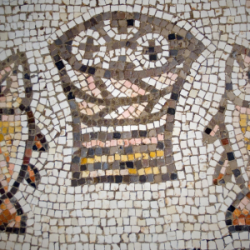Welcome readers! Please subscribe through the buttons on the right.
(Read this series from its beginning here.)

The story illustrates what we would call intersectionality today. Intersectionality is a way of describing the relationships between systems of oppression, domination, and discrimination. The model, first developed by Kimberlé Crenshaw, describes oppression as an interlocking matrix and helps us to examine how biological, social, and cultural categories such as gender, race, class, ability, sexual orientation, religion, caste, species and other axes of identity interact on multiple and often simultaneous levels and so contribute to systematic injustice and social inequality. The woman in this story experienced multiple social oppressions that also connected to the oppression of Jewish people under Rome: “The woman was a Greek, born in Syrian Phoenicia.”
Jesus questions her using the worst language: “Is it right to give the children’s bread to the dogs?”
No human should be called a dog, especially a woman of another race or ethnicity than one’s own.
Two of the most popular interpretations of this story explain that Jesus is merely play-acting to teach onlooking disciples an important lesson in generosity. I find this interpretation lacking, motivated not by honesty about the narrative but by a desire to protect Jesus from anything that might make him look bad. While I sympathize with this protectiveness, it is unconvincing.
The other more plausible and valuable explanation is that, in real time, Jesus is growing in his own understanding and experience of intersectionality.
This woman belonged to a people group that had once oppressed the Jewish people (i.e. Greeks), yet there is absolutely no indication she felt superior to Jewish people herself. She was also a woman trying to survive in a patriarchal culture. The patriarchal setting of this story begs the question, where is her husband? Why is her husband or the girl’s father not making this request of Jesus as other fathers do in Mark (cf. 5:22)? Is she a single mother? In a patriarchal world, what does it mean for this woman to speak for herself and her daughter?
The author of Mark has Jesus wrestling out loud: is it right for a Jewish male to help her, a Gentile and a woman?
Intersectionality helps us that every person has a complex identity. Just as the Greeks had once sought to exterminate the Hebrews, the ancient Hebrews had once engaged in the genocide and colonization of the Canaanites. The Hebrews also participated in cultural patriarchy similar to that in Hellenistic Tyre and Sidon, and though they suffered economic poverty under Rome’s high taxes during Jesus’ time, the Hebrews had also oppressed the poor with their own kings (Amos 2:6; 5:7, 11, 24). Yes, this Greek woman belonged to a people who had once oppressed the Hebrews, but that day, she needed liberation. Did Jesus have enough mercy for her as well?
What I appreciate about this story is that this woman has the courage to push back against Jesus’ harmful language to get him to see her humanity and the ugliness of his language. In the end, Jesus does understand and his compassion for her wins out. But we must not fail to see the depth of his struggle between genuinely questioning what was right, and allowing his questions to give way, not to “rightness,” but to compassion itself.
I think of Christians who still need the permission of their own sacred text to tell them that compassion is allowed or “right.” In this story, Jesus doesn’t wait for permission. He allowed compassion to govern his thinking, and ultimately arrived at the right choice.
I’m thankful for a woman who didn’t give up, but persisted in helping Jesus and his disciples see her shared humanity and immediate need despite their culturally conditioned prejudice. In that moment, she was the teacher of the teacher.
There’s something in this story for us, today, too. We’ll consider that, next.

















